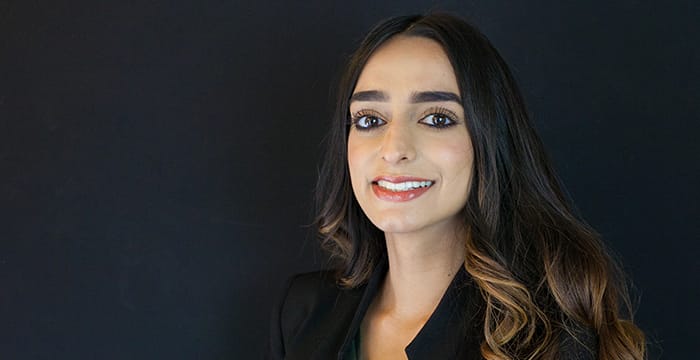Ashurst’s Aneesa Khan reflects on life as a dispute resolution associate ahead of the firm’s winter vac scheme deadline on 3 November

It was during her vacation scheme that Aneesa Khan first experienced Ashurst’s open-door policy. “On my first day, my supervisor, a partner at the firm, took me around the department and introduced me to everyone in the office, regardless of whether they were a partner, associate or a member of the secretarial team,” recalls Khan, who is now a dispute resolution associate in Ashurst’s London office.
For the then University of Warwick law student, this gesture was indicative of the firm’s non-hierarchical culture. “I was just an undergraduate student, but my supervisor really took the time to make me feel as though I was part of the team,” she says.
Since then, Khan has committed herself to further promoting the firm’s inclusive culture, particularly through initiatives recognising specific religious and cultural events. As a trainee, for example, Khan was involved in organising initiatives to celebrate Chinese New Year. Khan also led a panel event raising awareness of visible differences in the workplace. More recently, she played a role in organising an iftar event (the evening meal which Muslims end their daily Ramadan fast with at sunset) that the firm’s lawyers and their clients were invited to attend.
Khan now works closely with Ashurst chairman, Ben Tidswell, in heading up the firm’s newly-founded black, Asian and minority ethnic (BAME) working group, which focuses on the retention and progression of BAME employees at Ashurst. “It’s important for me to give back to other people by raising awareness of diversity and inclusivity, so that everyone is aware of differences that those from non-traditional backgrounds may experience at the firm,” she says. This initiative led to Khan being shortlisted as a ‘Top 10 BAME Future Leader’ at the Investing in Ethnicity Awards.
Khan’s eagerness to help others can be traced back to her university days. Outside of her studies, Khan got involved in Warwick’s outreach programme, aimed at increasing engagement with prospective students from underrepresented backgrounds. As part of this, she would travel to schools and colleges to answer questions on what it takes to study law. Khan, who is the first generation in her family to attend university, knew that she may be able to offer insights from her own experience. “I feel that if people can relate to you, they’re more likely to listen to what you have to say,” she explains.
Balancing these diversity and inclusion initiatives against her fee-earning responsibilities can be challenging and ultimately requires excellent time-management skills. “From Monday to Friday, it’s about prioritising what’s important,” Khan explains. This allows for hobbies, too, which for Khan, a supercar enthusiast, means attending international motor shows and occasionally taking a Ferrari or Lamborghini for a spin.
As a dispute resolution lawyer, Khan’s day-to-day life can vary. When she’s not responding to emails, drafting correspondence and attending internal meetings, Khan is often working closely with clients. She’s currently advising on an “incredibly large piece of litigation” relating to members of a trucks cartel found guilty of price collusion by the EU Commission.
For students hoping to follow in Khan’s footsteps, she recommends seeking out legal opportunities such as Ashurst’s upcoming winter vacation scheme. “When it comes to work experience, I don’t think you can ever have enough. It’s also great if you start at an early age. I’ve met a lot of first year students that have completed two or three first year schemes and have more opportunities lined up. It’s never too early to begin building your CV,” Khan advises.
For aspiring lawyers unsure about which winter vacation schemes to apply to, Khan suggests first identifying what exactly draws you to a particular firm. Looking back, Khan recalls being drawn to Ashurst’s global reach, offering “premium work” with an “impressive client base”. Indeed, as a trainee, Khan saw this first-hand during her six-month secondment to Ashurst’s corporate projects team in Dubai. There she had the opportunity to review draft legislation creating new ‘free trade zones’ — economic areas with their own special tax, customs and import regimes designed to attract foreign investment.
If working at an international level excites you, consider this when choosing optional modules in your undergraduate law degree. Khan, for example, found that undertaking modules in international law and Islamic law later proved useful, particularly when working in Dubai.
Applicants should also consider what type of training they want. Looking back, Khan cites Ashurst’s smaller trainee intake as a pulling factor. “In terms of work, it means trainees have a more fundamental role in the team, enjoy more responsibility and typically receive better work,” she explains.
A by-product of the firm’s recruitment strategy is a “close-knit culture” among trainees from different cohorts. “Fourth seat trainees will go out of their way to get to know first seat trainees. They will look out for you, even if you joined the firm at a different time — it really makes a difference,” Khan stresses.
About Legal Cheek Careers posts.
